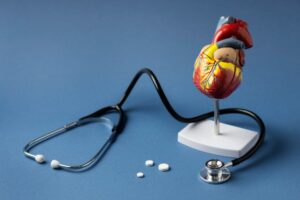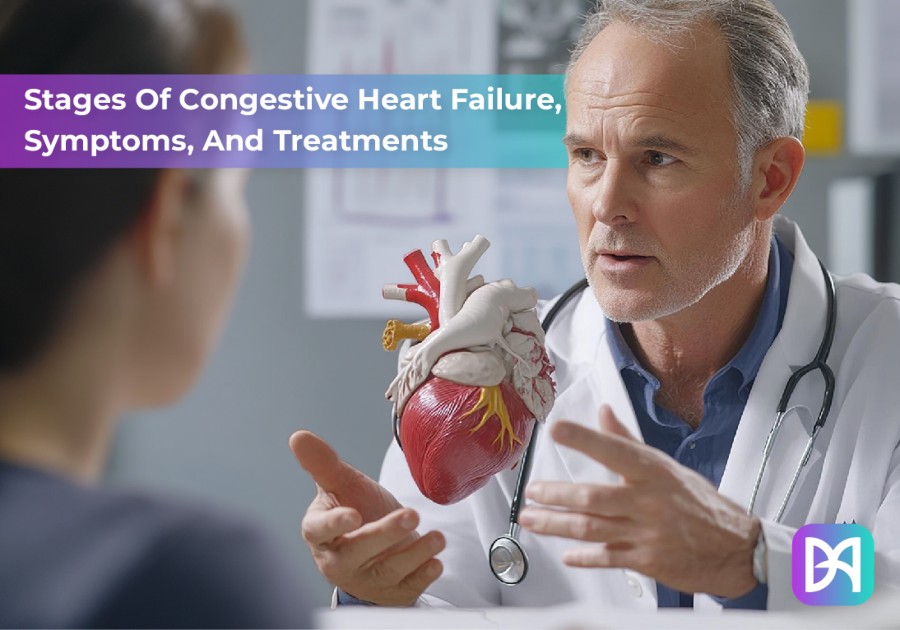A chronic illness known as congestive heart failure (CHF), or congestive heart disease, occurs when the heart is unable to pump blood effectively enough to fulfil the demands of the body. Your beating heart is still functional.
However, blood accumulates in other areas of your physique because it cannot handle the normal blood volume.
Imagine it as a transportation company overwhelmed with the volume of shipments it needs to deliver.
Things pile up because the shipping service needs to catch up. Things become problematic when they accumulate.
Table of Contents
ToggleMost Common Types of CHF
Congestive Heart Failure comes in several forms.
- Left-sided heart failure
- Right-sided heart failure
- High-output heart failure (infrequent)
Left-sided CHF is among the most prevalent kinds. It happens when the left ventricle in your body is unable to adequately pump blood forth.
As the illness worsens, fluid may accumulate in your lungs, making breathing challenging.
Congestive Heart disease
Congestive Heart disease on the left side can be of two types:

- Systolic Heart Failure. When the left ventricle is unable to narrow regularly, it happens. This lessens the force that may be used to propel blood into movement. This pressure is necessary for the heart to pump correctly.
- Diastolic Failure. It takes place when the left ventricle’s tissue stiffens. The heart cannot rest, which prevents it from filling with blood between pulses.
When the right ventricle struggles to pump blood to the airways, you develop right-sided CHF. Blood clots in your blood tubes result in retained fluid in your belly, lower limbs, and other important organs.
It is feasible to have right simultaneous- and left-sided CHF. If treatment is not received, the illness often begins on the left side and moves to the right.
Congestive Heart Failure Symptoms
It may include:
- Chest Pain
- Heart Palpitations
- Unusual Weight Gain
- Shortness of Breath
- Hard Stomach
- Loss of Appetite
- Dry Cough
- Fatigue when you are active
- Short Breathness at night
- Swelling in different parts of the body
You may occasionally experience none at all or very little Congestive Heart Failure Symptoms. This does not imply that your heart failure has disappeared.
Heart failure complaints can fluctuate in severity and vary from minor to severe.
Regretfully, congestive heart failure typically worsens with time. You can have additional or various signs as it becomes worse.
Causes of CHF
Other medical disorders that have a direct impact on your cardiovascular system might lead to CHF. For this reason, it’s critical to get yearly examinations to reduce your chance of heart health issues, such as:
- CHF may result from blood pressure that is greater than usual. There are several causes of hypertension. One of the consequences of artery hardening is elevated intravascular pressure.
- Coronary Artery Disease. The tiny arteries that feed blood to the heart are called coronary arteries, and they can get blocked by fats such as cholesterol. The arteries shrink as a result of this. Reduced blood flow from thinner coronary arteries can harm the heart muscle.
- Valve Conditions. The heart valves flap in and out to allow blood to enter and exit the heart rooms, controlling the amount of blood that flows through your heart. Incorrectly opening and closing valves might make your ventricles operate faster to pump blood. A cardiac abnormality or infection may be the cause of this.
Other conditions include:
- Obesity
- Thyroid Disease
- Diabetes
- Chemotherapy Drugs
Congestive Heart Failure Stages
Heart failure is a progressive illness that deteriorates over time. The four phases of cardiac failure are A, B, C, and D. From having an increased risk of cardiac arrest to having severe heart failure, they vary. The congestive heart failure stages are:
Stage A
Stage A, often known as pre-heart failure, indicates that you have a combination of any of the following medical disorders, a family past with congestive heart failure, or are otherwise very susceptible to heart failure:
- History of alcohol use disorder.
- History of rheumatic fever.
- Family history of cardiomyopathy.
- Coronary artery disease.
- Metabolic syndrome.
Stage B
If your left atrium is dysfunctional and/or anatomically aberrant but you have never had heart attack symptoms, you are in stage B (pre-heart failure).
Stage C
Individuals diagnosed with Stage C heart failure have been diagnosed with Congestive Heart Failure and have present or past indications of the illness.
Stage D
Individuals who have severe symptoms and are not responsive to treatment are diagnosed with heart failure with diminished ejection fraction, or stage D. This is heart failure’s ultimate stage.
Congestive Heart Failure Treatment
The sort of heart failure you have and its cause will determine how you will be treated. Each Congestive Heart Failure Treatment approach includes both lifestyle modifications and medication.
The suitable path of congestive heart failure treatment for you will be reviewed with you by your doctor. Heart failure cannot be cured.
Your heart muscle produces less blood to the tissues as congestive heart failure worsens, causing you to advance to the subsequent phase of heart failure. Treatment aims to prevent you from going through the stages faster or to retard the advancement of your heart failure because you cannot go backtrack through the phases of heart failure.




